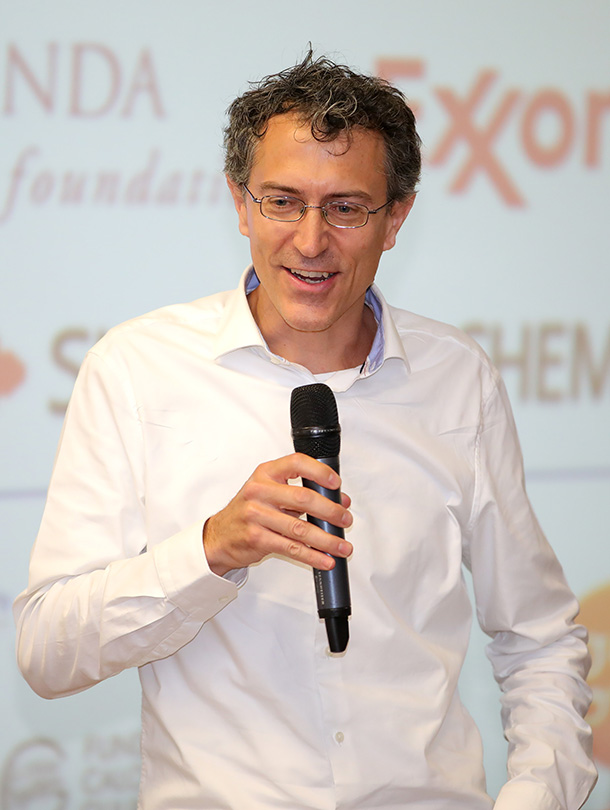Writing in Teaching and Research: Four Statements on Why it Matters
Do natural scientists write differently than humanities scholars? Are women better readers? What makes for good writing? On the occasion of the University’s «Writing Day» on 29 November 2018, four professors explain why writing matters for themselves and their disciplines.
15 November 2018
The quest for adequate written expression concerns us all – be it for an academic text, an application, minutes or an email. The University of Basel offers numerous opportunities to develop this core competency.
On Writing Day, professors, lecturers, students and postdocs from various faculties come together to examine the importance of writing – in consultations, workshops and panel discussions. Registration is required by Friday, 23 November 2018, as the number of participants is limited.
In the discipline of global health, the significance of writing cannot be overemphasized.
Prof. Dr. Jürg Utzinger, Swiss TPH
«In the discipline of global health, the significance of writing cannot be overemphasized. Of vital importance is precise language that allows no ambiguities and is universally understood in different linguistic and cultural contexts. English as the language of science plays a crucial role here.
Personally, I spend several hours a day writing and email remains the most important medium for me. It is all about a continuous exchange of information with people and networks from the local to the global levels. Writing allows me to express a variety of concerns; I can react to things individually and according to the situation and also consciously utilize the medium to motivate.»
Writing manuscripts describing experimental results and publishing them in widely read scientific journals is the best method to move biomedical research forward.
Prof. Dr. Nancy Hynes, Friedrich-Miescher-Institute for Biomedical Research
«I have worked in the biomedical research field for the past 30 years doing basic research on human breast cancer. The long-term goal of our work was to discover the genes and proteins that underlie this disease and eventually use this knowledge to devise strategies for treatment of breast cancer.
Writing manuscripts describing experimental results and publishing them in widely read scientific journals is the best method to move biomedical research forward. Therefore, concise, logical writing and a discussion of how the results can be used to move the field forward is one of the most important aspects of our discipline.»
In my work, writing has a performative quality.
Prof. Dr. Andreas Härter, University of St. Gallen
«In my work, writing has a performative quality: the writing process is a thinking process, in the course of which that about which one seeks to write becomes concrete. Reading is an indispensable aspect of this writing process. Seen in this light, writing is also always about participating in the continuity of the disciplinary discourse.
I have been a member of the Writing Lab of the University of St. Gallen since 2013. In addition to my teaching and research, I support students to cope with the characteristics and conditions of participating in this discourse: I guide them from the precision of terminology and arguments and the use of textual strategies and style elements to questions of research and correct referencing.»
If I did not write every day, I would not feel good.
Prof. Dr. Andrea Maihofer, Center of Gender Studies, University of Basel
«Writing is a central part of my life. If I did not write every day, I would not feel good. That does not mean that writing comes easily to me. It is an important form of reflection and intellectual pleasure for me. At the same time, I highly value public dialogue. My aim is to be understood, because there is something at stake for me. This, however, implies different forms of writing, depending on whether I am communicating with an academic or a general audience.
Do women write differently than men? In regard to academic writing, I would say no. Yet one can observe that men more rarely read texts by women, whereas women more often also read texts by men. This is why women tend to have a broader overview of the current academic debate. The areas of focus tend to be different as well. »
High Demand for Support
The first «Writing Day» took place in 2017 and was initiated by the Language Center of the University of Basel and the Netzwerk Schreiben – an association of instructors offering writing courses and coaching in the University’s faculties and other academic institutions. This collaboration came about in response to the high demand for writing support across the University.
Further information
Dr. Petra Gekeler, University of Basel, Language Center, email: petra.gekeler@unibas.ch







